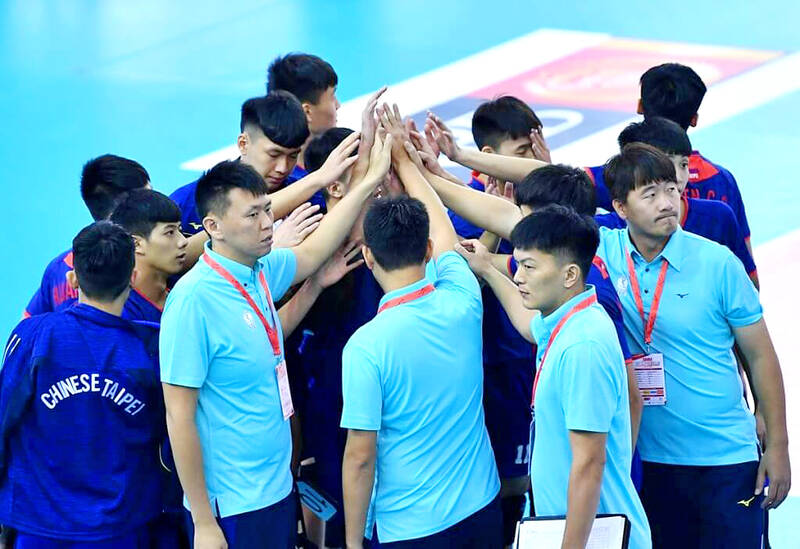Taiwan has withdrawn from hosting the Asian Men’s U20 Volleyball Championship this year due to China’s objection on political grounds, a press release on the Iran Volleyball Federation’s Web site said on Tuesday.
The Asian Volleyball Confederation wrote on Facebook that the tournament, originally scheduled to be held in Taiwan from July 20 to July 27, would be hosted in Surabaya, Indonesia, from July 23 to 30.
The confederation’s post did not offer any reason for the change, but the Iranian body’s press release, recapping an online meeting of the confederation on Tuesday, said that Taiwan made a decision to “withdraw” from hosting the tournament.

File Photo: grab from Chinese Taipei Volleyball Association (CTVA) website
“The reason behind the withdrawal was China’s objection, on political grounds, to its ability to participate in the competition,” the press release said.
Participation in the competition was “a topic of relevance” because it is Asia’s qualification tournament for the Men’s U21 World Championships next year, the press release said.
China had since last month demanded a change in hosts, but the final decision was made at the confederation’s meeting, sources said.

Photo: CNA
Taiwan’s national volleyball association has not commented on what transpired.
Its secretary general, Huang Kuo-kuang (黃國光), said that the association would follow the Asian body’s schedules and arrangements.
China sent a team to Taiwan to participate in the tournament in 2016, but since the Taipei 2017 Universiade, it has not attended any sports events in the nation.
The national association is still preparing to host the Asian Women’s Volleyball Challenge Cup this year, likely consisting of 12 teams, Huang said, adding that the tournament’s dates are yet to be finalized.
Separately, a professor yesterday said that China is enhancing its pressure on the Democratic Progressive Party (DPP) government given the results of Saturday’s presidential election, citing Nauru on Monday cutting diplomatic ties with the nation and the volleyball decision.
Kuo Yu-jen (郭育仁), a professor at National Sun Yat-sen University’s Institute of China and Asia-Pacific Studies, said that Beijing was not going to change its plans regarding Taiwan — which include signing a cross-strait peace treaty and starting negotiations for unification — no matter who won the presidency, even if the Chinese Nationalist Party’s (KMT) candidate, New Taipei City Mayor Hou You-yi (侯友宜), had won.
China would continue to put pressure on Taiwan and might have even accelerated its plans had Hou won, Kuo said.
Making Nauru cut ties was to put pressure on the DPP-led government and demand that Vice President William Lai (賴清德), who won the presidency, accept the so-called “1992 consensus,” Kuo said.
However, were Taiwan to accept, it would be locked into a “one China” framework leading to negotiations over unification, he said.
The “1992 consensus,” a term former Mainland Affairs Council chairman Su Chi (蘇起) in 2006 admitted making up in 2000, refers to a tacit understanding between the KMT and the Chinese Communist Party that both sides of the Strait acknowledge there is “one China,” with each side having its own interpretation of what “China” means.

A Chinese freighter that allegedly snapped an undersea cable linking Taiwan proper to Penghu County is suspected of being owned by a Chinese state-run company and had docked at the ports of Kaohsiung and Keelung for three months using different names. On Tuesday last week, the Togo-flagged freighter Hong Tai 58 (宏泰58號) and its Chinese crew were detained after the Taipei-Penghu No. 3 submarine cable was severed. When the Coast Guard Administration (CGA) first attempted to detain the ship on grounds of possible sabotage, its crew said the ship’s name was Hong Tai 168, although the Automatic Identification System (AIS)

An Akizuki-class destroyer last month made the first-ever solo transit of a Japan Maritime Self-Defense Force ship through the Taiwan Strait, Japanese government officials with knowledge of the matter said yesterday. The JS Akizuki carried out a north-to-south transit through the Taiwan Strait on Feb. 5 as it sailed to the South China Sea to participate in a joint exercise with US, Australian and Philippine forces that day. The Japanese destroyer JS Sazanami in September last year made the Japan Maritime Self-Defense Force’s first-ever transit through the Taiwan Strait, but it was joined by vessels from New Zealand and Australia,

SECURITY: The purpose for giving Hong Kong and Macau residents more lenient paths to permanent residency no longer applies due to China’s policies, a source said The government is considering removing an optional path to citizenship for residents from Hong Kong and Macau, and lengthening the terms for permanent residence eligibility, a source said yesterday. In a bid to prevent the Chinese Communist Party (CCP) from infiltrating Taiwan through immigration from Hong Kong and Macau, the government could amend immigration laws for residents of the territories who currently receive preferential treatment, an official familiar with the matter speaking on condition of anonymity said. The move was part of “national security-related legislative reform,” they added. Under the amendments, arrivals from the Chinese territories would have to reside in Taiwan for

CRITICAL MOVE: TSMC’s plan to invest another US$100 billion in US chipmaking would boost Taiwan’s competitive edge in the global market, the premier said The government would ensure that the most advanced chipmaking technology stays in Taiwan while assisting Taiwan Semiconductor Manufacturing Co (TSMC, 台積電) in investing overseas, the Presidential Office said yesterday. The statement follows a joint announcement by the world’s largest contract chipmaker and US President Donald Trump on Monday that TSMC would invest an additional US$100 billion over the next four years to expand its semiconductor manufacturing operations in the US, which would include construction of three new chip fabrication plants, two advanced packaging facilities, and a research and development center. The government knew about the deal in advance and would assist, Presidential